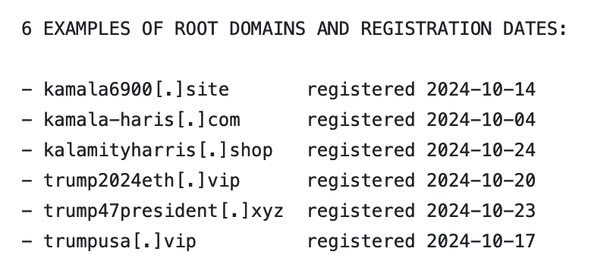
As the United States of America enters the final days of the race for the White House, the FBI has warned that fraudsters are using the presidential election campaign to scam citizens out of their savings and personal data.
According to a public service announcement published by the Internet Crime Complaint Center (IC3), scammers who have previously exploited state and local elections are targeting victims across the United States in the run-up to the general election vote on November 5, 2024.
Using the images, names, logos and slogans of candidates, fraudsters are scamming the unwary into making bogus campaign contributions, stealing personally identifiable information, and selling merchandise that will never be delivered.
In its advisory, the FBI detailed some of the different types of scams the fraudsters are operating:
Campaign Investment Pool Scheme
Victims are promised that they will make a profitable return if they invest in a fund to assist a particular candidate's campaign. The scammers guarantee that the fund will grow, and be returned after the successful election of the candidate. Victims are even encouraged to recruit others to contribute to the fraudulent fund.
Merchandise Online Purchase Scam
Lured in by merchandise that carries the slogan or name of a political candidate, victims hand over their payment details and personal information. However, the company selling the goods is not affiliated with the political campaign, merchandise is never shipped, and the victims lose their money as well as their personal information.
Scam Voter Registration
Text messages and emails are sent to potential victims telling them that they are not registered to vote, providing a link to a bogus state voter registration webpage. The messages can be received regardless of whether you are really registered to vote or not - in a scheme designed to trick unsuspecting citizens into handing over personally identifiable information which can later be exploited for the purposes of identity theft and other scams.
Scam Political Action Committees
Scammers pretending to be affiliated with a legitimate Political Action Committee (PAC), such as a Super PAC or candidate’s campaign committee, trick victims into believing that they are making a legal campaign donation to a legitimate PAC, but instead, the fraudster simply pockets the money.
Security researchers agree with the FBI that scammers are exploiting interest in the US elections.
Palo Alto Networks' Unit 42 division says that it has seen a surge in newly-registered domains impersonating the campaigns of both Donald Trump and Kamala Harris for a variety of criminal purposes - including cryptocurrency scams, donation phishing, and fake merchandise stores.

Fortunately, there are simple steps you can take to reduce the chances that you fall foul of such scams:
- Be wary of unexpected calls, text messages, emails, or surveys, especially if they ask for personal information.
- Do not trust links sent to you by unknown senders.
- Remember that donations to a political campaign are not investments; you will not be sent your money back with a profit.
- Legitimate PACs and campaign committees will be registered on the Federal Election Commission (FEC) website, although you would be wise to remember that inclusion on the list does not mean that the PAC that has contacted you is not a scam.
- Be wary of purchasing merchandise from organisations you may not have dealt with in the past, as well as domains that have only been created recently. Research online to check a store's legitimacy, and look for customer reviews and complaints at the Better Business Bureau (BBB).
- You can check the status of your vote registration at www.vote.gov.
If you believe you have received a message from a fraudster, report details of it to the team at the IC3 as it can help prevent scammers from tricking others.
You might be wise to proceed with caution if you're in any doubt and question the claims and motives of anyone who asks you for money or personal information in the run-up to the US Presidential Election.
Just as you would be wise to approach your choice as who to vote for at the US Presidential Election with careful consideration too!
Editor's Note: The opinions expressed in this guest author article are solely those of the contributor and do not necessarily reflect those of Tripwire.
